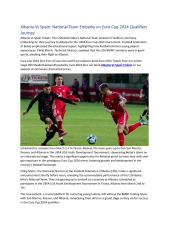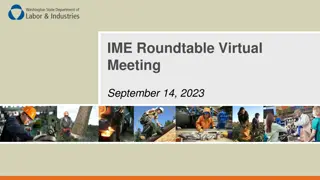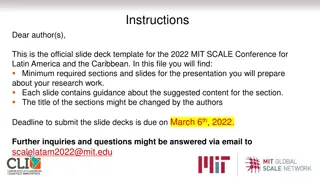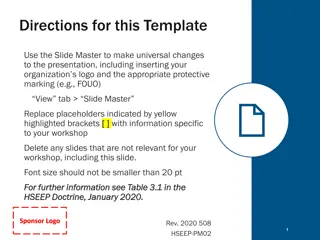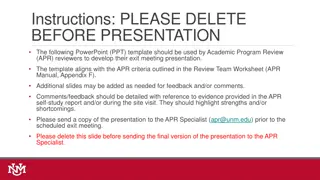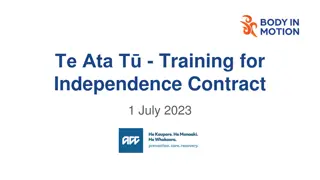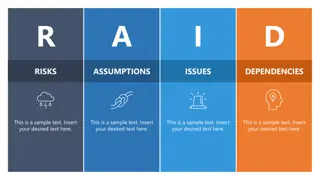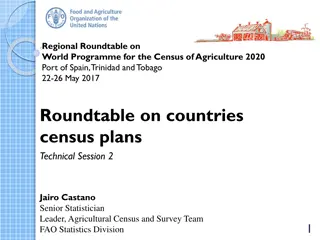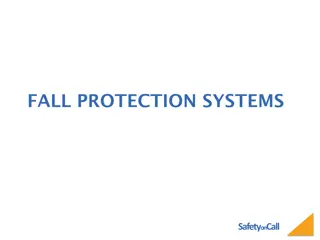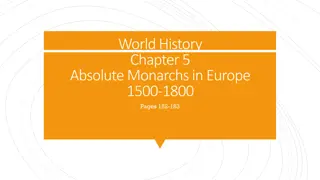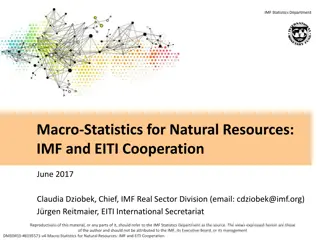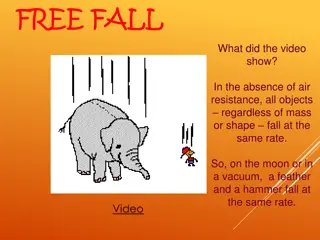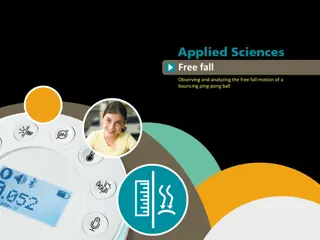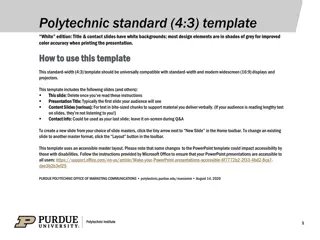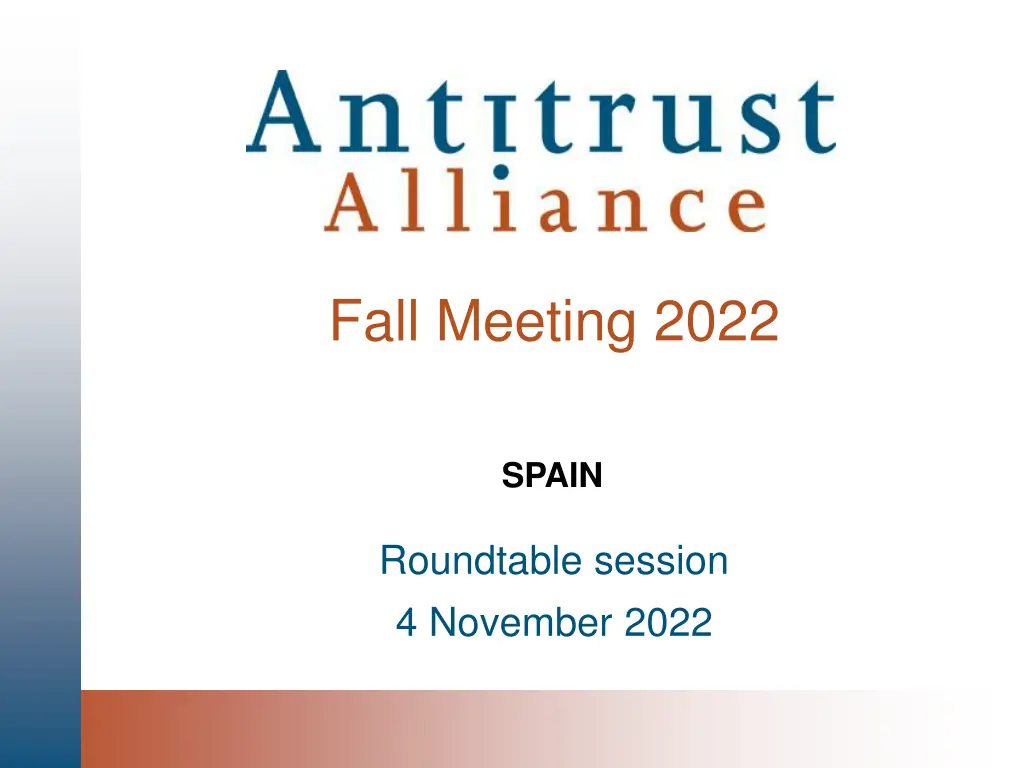
Roundtable Session on Key Legal Developments in Spain 2022
Explore the significant legal developments discussed in the Fall Meeting 2022's Roundtable Session in Spain, including changes in team members, important legislation, and relevant case laws with EU implications. Understand the repercussions of anti-competitive behaviors in the construction industry and the impacts of government-approved subsidies on fuel prices. Stay informed about the fines, sanctions, and ongoing legal battles shaping the legal landscape in Spain.
Download Presentation

Please find below an Image/Link to download the presentation.
The content on the website is provided AS IS for your information and personal use only. It may not be sold, licensed, or shared on other websites without obtaining consent from the author. If you encounter any issues during the download, it is possible that the publisher has removed the file from their server.
You are allowed to download the files provided on this website for personal or commercial use, subject to the condition that they are used lawfully. All files are the property of their respective owners.
The content on the website is provided AS IS for your information and personal use only. It may not be sold, licensed, or shared on other websites without obtaining consent from the author.
E N D
Presentation Transcript
Fall Meeting 2022 SPAIN Roundtable session 4 November 2022
A. Changes in team members and important legislative developments NA 2 2
B. Relevant case law with EU importance I.- CIVIL WORKS RESOLUTION 2. S/0021/20: Fine of 203.6 millions imposed by CNMC on 6 of Spain's leading construction companies for altering the competitive process in infrastructure construction tenders for more than 25 years. Background: Since 1992, Acciona, Dragados, FCC, Ferrovial, Huarte and Sacyr met weekly, analysed and decided on the public contract tenders in which they were going to share technical work for their bids. They also exchanged information on their bidding strategy for public tenders. Additionally, in their weekly meetings, the companies exchanged sensitive commercial information (other than that necessary to share the works), for example, their intention to bid or not to bid for tenders, or the intention to form temporary joint ventures (UTE) and the members that would integrate them. These conducts constitute a very serious infringement of Articles 1 of Spanish Act, on the Defense of Competition and 101 of the TFUE. 3
B. Relevant case law with EU importance Effects of anti-competitive behaviours: The collusive agreements sanctioned resulted in a lower variety and quality of the technical offers submitted by the companies to the contracting Administrations. The competing companies that bid for public contracts found themselves at a competitive disadvantage against the group of cartelized companies, since they had to incur a higher cost for the preparation of the technical proposals. Moreover, since they did not have the same strategic information as the companies in the collusive agreement, the terms of fair competition among all bidders were altered. The large number of works that were carried out under these collusive agreements greatly increased the amount of money involved in such works. Reiterative practice that caused a prolonged duration in time of the anticompetitive conducts. Current situation: The companies have been imposed economic sanctions and a ban on contracting with the Administration. This Resolution has been appealed before the Audiencia Nacional . 4
B. Relevant case law with EU importance II.- CNMC INFORMATION BULLETIN regarding the government-approved subsidy on a litre of petrol and its transfer to the consumer. Background: The Spanish government, through Royal Decree-Law 6/2022, establishes that service stations will receive a rebate of 20 euro cents per litre of fuel, which will be returned to them by the Administration. This obligation was initially established for the period April-June 2002 and has been extended until December 2022. Monitoring by the CNMC: The CNMC monitors service stations/gas stations to verify the effectiveness of the rebate for consumers (verifying the amount of discounts granted by operators; supervising the effectiveness of the discount for consumers; and reporting cases that should be reported to the inspection of the administrations responsible for ensuring the effective implementation of the discount). 5
B. Relevant case law with EU importance On a monthly basis, a report is published analysing the evolution of prices, gross margins and the relationship with the evolution of international prices, among other aspects. There are some 12,000 service stations in Spain and in 60% of the cases it is the owner of the service station who sets the price, while in the remaining 40% it is the wholesale operators who set the prices. CNMC Comments (IS/DE/010/22 - 07 July 2022): The CNMC has concluded that, in general, the fuel distribution market through service stations appears to be passing on the bonus to the consumer. However, it does not rule out that some individual service stations have absorbed part of the 20 c/litre bonus and have increased margins. The CNMC continues to monitor this market, attentive to the alerts and complaints received and in continuous collaboration with the entities responsible for ensuring the proper application of this measure and the effectiveness of the rebate for consumers. 6
C. Cases handled by the team I.- The CNMC fines pharmaceutical company Merck Sharp and Dohme (MSD) 39 million euros for abuse of a dominant position in the market for vaginal contraceptive rings. (October 2022). The pharmaceutical company MSD enjoyed a monopoly from 2002 until 2018 as it held the patent protecting the contraceptive Nuvaring, the first vaginal ring in Spain. A competing company Insud Pharma had developed an alternative vaginal ring to the one protected by MSD's patent, which was launched in June 2017 under the name Ornibel In 2017, MSD took unjustified legal action against its competitor Insud Pharma under the pretext of protecting its patent. With this strategy, it sought to delay the market entry of its competitor's product. Madrid, 25 October 2022. CNMC has considered that the purpose of MSD's legal actions was not to enforce its patent rights, but was part of a plan to suppress competition from the new market entrant for as long as possible. 7
C. Cases handled by the team II.- Ongoing: Two weeks ago we were contracted by the most important chain of motorcycle clothing stores in Spain, which is the distributor in Spain of its supplier (a Dutch multinational). Background: For 4 years, the Dutch supplier has imposed resale prices and discounts on the distributor to apply to customers in stores and online. When the distributor does not follow the supplier's instructions, the supplier intermittently denies supply to the distributor. Legal actions to file: - We are preparing a lawsuit before the Spanish commercial Court for breach of the distribution agreement; and - A complaint before the CNMC for infringement of competition regulations. 8
D. Publications and other LA INFORMACI N RESERVADA. EL EXPEDIENTE HU RFANO DE REGULACI N DETALLADA EN COMUNITARIA DE DEFENSA DE LA COMPETENCIA INFORMATION. THE FILE ORFAN OF DETAILED REGULATION IN THE SPANISH AND EUROPEAN DEFENCE OF COMPETITON REGULATIONS) Author: ngel Vald s. It has been published last October, 2022 by Aranzadi-Civitas (Thomson Reuters Group) Competition Law Yearbook 2022. LA NORMATIVA ESPA OLA (PRIVILEDGED Y Second Seminar on Competition Dawn Raids within the EU. Speaker: ngel Vald s Competition Law Masters program of the Universidad Carlos III. Madrid, September 2022. Seminar on Competition Law for Directors and Managers. Speaker: ngel Vald s To be held at the premises of Merck (MSD), S.A.(pharmaceutical company) in Madrid, November 2022. 9


